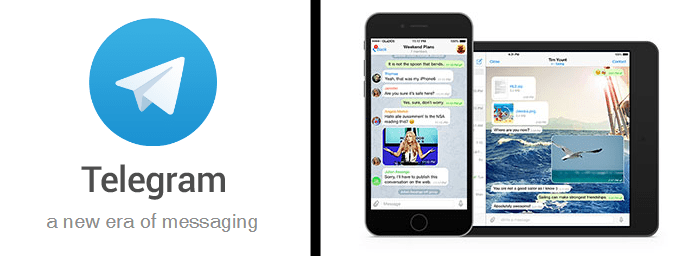
TL; DR: It has become a trend for companies to hire remote employees, and that’s especially true when it comes to IT and dev teams. Telegram offers a solution to keep those teams talking and collaborating. The free, cloud-based messaging platform syncs with most any device, doesn’t restrict media size, and, most importantly, is secure. In fact, Telegram’s Founder is so confident in the platform’s security he’s offering a $200,000 reward to anyone who can crack the encryption. With the ability to create and manage groups and an open API that allows developers to customize the experience, the platform is a valuable tool for companies looking to maintain open lines of communication between teams.
The Society for Human Resource Management has reported poor communication costs companies with more than 100,000 employees $62.4 million per year and companies with an average of 100 employees roughly $420,000 per year. Regardless of a business’s size, those sums are not chump change.
Breakdowns in communication can happen company-wide; however, in the modern age where bottom lines rely so heavily on technology, disconnects in dialogue across IT teams can be detrimental to a business. As companies increasingly employ remote and offshore developers and support staff, the likelihood of these communication lags occurring only increases.

Telegram’s messaging platform allows seamless interaction and collaboration among remote employees.
Enter Telegram, a cloud-based messaging app that enables development teams to communicate, coordinate, and cooperate in real time. The platform allows users to connect with people from thousands of miles away, form collaborative groups with as many as 5,000 members, and sync conversations across multiple devices.
On top of that, Telegram boasts some of the strictest security protocols in the world. That means developers can be sure their sensitive communications will never be exposed to prying eyes. Telegram’s open API also allows users to customize the experience by creating applications on the platform. Telegram is free, easy to use, and a reliable system to keep teams in touch.
Free, Cloud-Based Messenger With Seamless Sync Gets Users Talking
The cloud-based platform gives users the power of seamless synchronization, so they don’t have to transfer messages from one device to another. The entire message history is stored in the Cloud. Users sign in on any supported device and instantly access all relevant messages, chats, and files.
Telegram currently works on a number of platforms, including iPhone/iPad, Android, Windows Phone, Windows PC, OSX, and Linux. With Telegram’s cloud support and cache management options, the app can literally take up zero space on a smartphone. For users that want to avoid a platform-specific installation, Telegram offers a web-based version of the app.
Telegram is free, but that doesn’t mean the platform is loaded with ads and annoying pop-ups. Committed to creating a positive user experience, Telegram skips the ads and, currently, monetization. The platform is fully funded by Pavel Durov, who launched the app with the help of his brother and business partner Nikolai, without profit-focused goals.
Telegram allows users to share an unlimited number of files — videos, photos, audio clips, text files, spreadsheets, ZIP files, and any other file format developers use to collaborate.

Telegram offers a native app for every type of platform, which makes it easy for users to sync devices.
Making connections with other users is as easy as starting a dialogue with anyone in your contact list, provided they have the app, too. Those who want to make themselves visible to users who may not have their contact info can just create a username. Then, other Telegram users can search for said username and initiate a conversation.
Telegram also makes it easy for people to advertise their presence on the app. Each individual with a username also has a Telegram-specific URL they can include as part of their email signature. The URL consists of a telegram.me prefix followed by a slash and the username.
Create Groups of Up to 5K Members to Inspire Dialogue and Creativity
Beyond support for one-on-one communication, Telegram facilitates group discussions. There are three different types of forums supported: Channels, Groups, and Supergroups.
Channels are meant for broadcast announcements. An unlimited number of members are allowed.
Groups are ideal for small teams. By default, they allow up to 200 members, each of whom can add new people and edit the group photo.
Supergroups live up to their name, supporting up to 5,000 members. With such a large membership, relaying critical information in a timely manner may seem difficult without it being lost in a sea of messages. However, admins are empowered to inform other group members of important items with the use of pinned messages. These stay pinned at the top of the screen so every member sees them.
Supergroup admins also have access to moderation tools, which can be used to delete all messages of a particular user in the event he or she gets out of line or starts spamming the forum.
Confident in Security: $200K Reward for Anyone Who Breaks Encryption
When it comes to app security, the financial backer of Telegram has literally put his money where his mouth is.
Pavel Durov issued a challenge to the public. If someone manages to break Telegram’s encrypted protocol, he or she will win a cool $200,000.
Here are the specifics of the challenge:
Each day Paul (+79112317383) will be sending a message containing a secret email address to Nick (+79218944725). In order to prove that Telegram crypto was indeed deciphered and claim your prize, send an email to the secret email address from Paul’s message.
Your email must contain:
- The entire text of the message that contained the secret email
- Your Bitcoin address to receive the $200,000 in BTC
- A detailed explanation of the attack
Durov’s confidence isn’t unwarranted. Telegram’s message security is based on a 256-bit asymmetric AES encryption, 2048-bit RSA encryption, and a Diffie-Hellman secure key exchange thrown in for good measure.

Pavel Durov, Telegram’s Founder, offers $200,000 to anyone who can break the platform’s encrypted protocol.
In addition, users can opt to use private chat, which adds a client-client layer of encryption on top of the server-client layer that exists for group messaging.
The bottom line: Messages sent and received via Telegram are very secure.
Open API Allows Developers to Customize Tools for the Platform
Companies that employ Telegram can prevent communication breakdowns and the loss of revenue that inevitably follows. However, when it comes to modern development teams, it’s often not enough to communicate with just text messages, emojis, and files. Sometimes customized communications are in order.
That’s why Telegram makes their two APIs available to developers who can tailor Telegram to their needs.
The Bot API provides automated functionality within the Telegram ecosystem. It can deliver customized news headlines, integrate seamlessly with other services, and even play games.
The Telegram API allows devs to build custom Telegram clients. Developers will, of course, have to obtain their own App ID to start building, and they’ll need to familiarize themselves with the user authorization process and follow Telegram’s security guidelines.
The fact that Telegram offers an API demonstrates the company understands the importance of extensibility, speaking volumes of Telegram’s commitment to a positive user experience.
HostingAdvice.com is a free online resource that offers valuable content and comparison services to users. To keep this resource 100% free, we receive compensation from many of the offers listed on the site. Along with key review factors, this compensation may impact how and where products appear across the site (including, for example, the order in which they appear). HostingAdvice.com does not include the entire universe of available offers. Editorial opinions expressed on the site are strictly our own and are not provided, endorsed, or approved by advertisers.
Our site is committed to publishing independent, accurate content guided by strict editorial guidelines. Before articles and reviews are published on our site, they undergo a thorough review process performed by a team of independent editors and subject-matter experts to ensure the content’s accuracy, timeliness, and impartiality. Our editorial team is separate and independent of our site’s advertisers, and the opinions they express on our site are their own. To read more about our team members and their editorial backgrounds, please visit our site’s About page.

